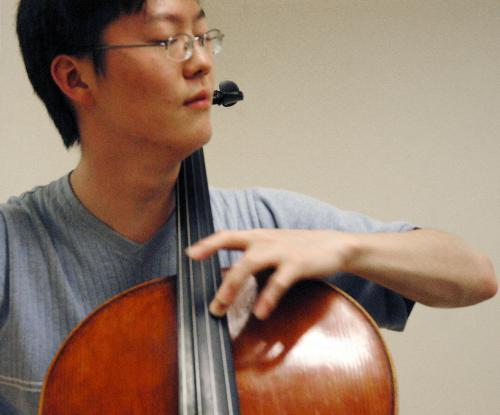
News
Cambridge Residents Slam Council Proposal to Delay Bike Lane Construction

News
‘Gender-Affirming Slay Fest’: Harvard College QSA Hosts Annual Queer Prom

News
‘Not Being Nerds’: Harvard Students Dance to Tinashe at Yardfest

News
Wrongful Death Trial Against CAMHS Employee Over 2015 Student Suicide To Begin Tuesday

News
Cornel West, Harvard Affiliates Call for University to Divest from ‘Israeli Apartheid’ at Rally
Rare Trip to North Korea for Cellist Koh

Nearly 40 years ago, as a consequence of traveling to North Korea, composer Isang Yun was forced to leave his homeland of South Korea and go into exile in Germany. More than 30 years later, cellist Bong Ihn Koh ’08 would also live in South Korea and Berlin, discovering Yun’s music along the way.
On Oct. 20, Koh will make the journey that proved fateful for Yun, traveling to Pyongyang to perform Yun’s “Cello Concerto” as part of a festival honoring the composer, who died in 1995. The Isang Yun World Peace Concert, a rare event that brings together musicians from both North and South Korea, is a joint effort between the South’s Isang Yun Peace Foundation and the North’s Yun I Sang Music Institute. Koh will perform with the Isang Yun Orchestra and renowned Seoul Philharmonic Orchestra conductor Chung Myung-Whun.
Though soft-spoken, Koh, a biochemical sciences concentrator in Cabot House, exudes passion and enthusiasm when he talks about Yun, a personal hero for the cellist. “Yun said, ‘You can express the world’s pain through music,’ which I believe in,” says Koh. Though born in South Korea, Koh did not encounter the music of Yun until his high school years in Berlin. It was after watching a documentary on Yun that Koh decided to champion the music of his fellow countryman. “I was moved beyond description,” explains Koh. “I felt that his life was to be emulated in order to lead my life as a true musician.”
In 1967, the South Korean Secret Police arrested Yun and sentenced him to death for alleged communist ties after he visited North Korea in order to organize concerts that would involve musicians from both countries. The news provoked international outrage from artists like Igor Stravinsky and Herbert von Karajan. Though South Korea eventually released Yun, he would live in exile for the rest of his life.
In 2003, Koh—who studies at the New England Conservatory as part of a joint five-year B.A./M.M. program—won second prize in the Gyeongnam International Music Competition.
Koh was particularly affected by the location of the competition: Yun’s birthplace of Tongyeong, South Korea. “[I felt] a wave of emotion when I arrived in Tongyeong,” recalls Koh. “The hotel I was staying at was right on the coast, which Yun missed most during his exile. I arrived late in the evening and was unaware of the beauty of Yun’s memories of his
hometown until the next morning, when I woke up to a breathtaking sight of the Tongyeong coast. I felt great sympathy towards Yun and his longing for his return.”
Yet Koh was disappointed by one aspect of the competition: the apathy towards Yun’s music that many of Koh’s competitors expressed. In what was supposed to be a competition honoring the composer’s accomplishments, Koh would be the only participant to perform one of Yun’s pieces—the challenging 1976 “Cello Concerto”—in the final rounds.
Both his performance and choice of repertoire caught the attention of Yun’s widow as well as Siegfried Palm, the cellist for whom the concerto was originally written. Sooja Yun, who currently resides in North Korea, was so impressed that she personally recommended that Koh be the soloist in the upcoming festival.
The musical language of the “Cello Concerto” is rooted in the European avant-garde tradition, yet it is also packed with references to Korean folk music. Techniques such as pizzicato and the use of glissando echo instruments native to Korea.
Koh possesses a deep affinity for Yun’s concerto.
“I see it as a reflection of his time in prison and of his life,” explains Koh. He vividly describes the ending of the concerto as a significant part of this reflection. “The cello is raging—it’s reaching for the high A with the orchestra supporting it. It sustains a G-sharp for eight measures in fortississimo with intense vibrato. It never reaches the A, though.”
The struggling cello never reaches its desired destination. But the accompanying orchestra does, first by a plaintive oboe solo, then by a pair of ethereal-sounding trumpets. The pitch A then fades into silence.
Want to keep up with breaking news? Subscribe to our email newsletter.
